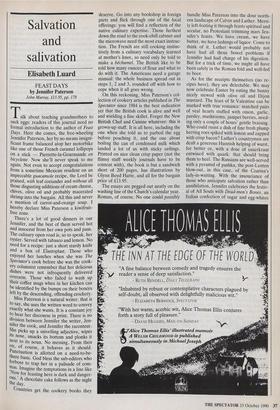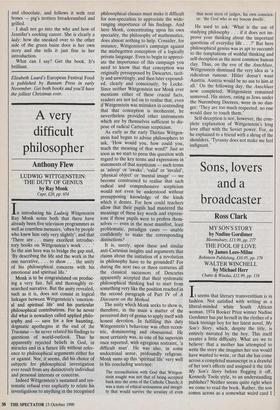Salvation and salivation
Elisabeth Luard
FEAST DAYS by Jennifer Paterson John Murray, £13.95, pp. 178 Talk about teaching grandmothers to suck eggs: readers of this journal need no formal introduction to the author of Feast Days. Here she comes, the free-wheeling Jennifer Paterson, her by no means insigni- ficant frame balanced atop her motorbike like one of those French caramel lollipops on a stick — Pierrette-la-Gourmande en bicyclette. Now she'll never speak to me again. Not even to accept congratulations from a sometime Mexican resident on an impeccable guacamole recipe, the Lord be praised, with leaf coriander and without all those disgusting additions of cream cheese, chives, olive oil and probably macerated shrimp into the bargain. All this and never a mention of carrot-and-orange soup. I hereby declare Miss Paterson a kiwifruit- free zone.
There's a lot of good dinners in our Jennifer, and the best of them served hot and innocent from her own pots and pans. The culinary open road is, so to speak, her oyster. Served with tabasco and lemon. No need for a recipe: just a short sturdy knife and a box of Elastoplast. Those who enjoyed her lunches when she was The Spectator's cook before she was the cook- ery columnist remember that her delicious dishes were not infrequently delivered overarm. Those who failed to wash up their coffee mugs when in her kitchen can be identified by the bumps on their bonces left by the descending, offending crockery. Miss Paterson is a natural writer: that is to say, she uses the written word to convey exactly what she wants. It is a constant joy to hear her discourse in print. There is no division between Jennifer the writer, Jen- nifer the cook, and Jennifer the raconteur. She picks up a snivelling adjective, wipes its nose, smacks its bottom and plonks it next to its noun. No messing. From then on, of course, it behaves as it should. Punctuation is allotted on a need-to-be- there basis. God bless the sub-editors who forbore to trap her in a palisade of com- mas. Imagine the temptations in a line like Now for feasting here is dark and danger- ous.' A chocolate cake follows as the night the day.
Countries get the cookery books they deserve. Go into any bookshop in foreign parts and flick through one of the local offerings: you will find a reflection of the native culinary expertise. Those furthest down the road to the cook-chill cabinet and the microwave need the most exact instruc- tion. The French are still cooking instinc- tively from a culinary vocabulary learned at mother's knee, so need only be told to make a béchamel. The British like to be told how many ounces of flour and what to do with it. The Americans need a garage manual: the whole business spread out in steps 1, 2 and 3, rounded off with how to cope when it all goes wrong.
On this reckoning, Miss Paterson's col- lection of cookery articles published in The Spectator since 1984 is the best indication yet that the British cook is alive and well and wielding a fine skillet. Forget the New British Chef and Cuisine whatever: this is grown-up stuff. It is all here, including the one when she told us to parboil the egg before poaching it, and the one about boiling the can of condensed milk which landed a lot of us with sticky ceilings. Printed on nice clean crisp paper (not the flimsy stuff weekly journals have to be content with), the book is but a sandwich short of 200 pages, has illustrations by Glynn Boyd Harte, and all for the bargain price of £13.95.
The essays are pegged out neatly on the washing line of the Church's calendar year. Roman, of course. No one could possibly bundle Miss Paterson into the dour north- ern landscape of Calvin and Luther. Merri- ly left-footing it through feasts spiritual and secular, no Protestant trimming mars Jen- nifer's feasts. We have cream, we have butter, we have lashings of liquor. Come to think of it, Luther would probably not have had all those bowel problems if Jennifer had had charge of his digestion. But for a trick of time, we might all have been safely in the Roman fold and well-fed to boot.
As for the receipts themselves (no re- cipes here), they are delectable. We may now celebrate Easter by eating the bunny nicely stewed with olive oil and Dijon mustard. The feast of St Valentine can be marked with true romance: matched pairs of veal hearts stuffed with onion, garlic, parsley, mushrooms, juniper berries, need- ing only a couple of hours' gentle braising. Who could resist a dish of fine fresh plump herring roes spiked with lemon and zapped with crisp bacon? Luther's countrymen are dealt a generous Hunnish helping of wurst, for better or, with a dose of sauerkraut entwined with quark: that should bring them to heel. The Russians are well-served with a pyramid of pashka, the post-Lenten blow-out, in this case, of the Czarina's lady-in-waiting. With the insouciance of those who anticipate salvation rather than annihilation, Jennifer celebrates the festiv- al of All Souls with Dead-men's Bones, an Italian confection of sugar and egg-whites and chocolate, and follows it with real bones — pig's trotters breadcrumbed and grilled.
I shall not go into the why and how of Jennifer's cooking career. She is clearly a lady: how she sneaked over to the other side of the green baize door is her own story and she tells it just fine in her introduction.
What can I say? Get the book. It's brilliant.
Elisabeth Luard's European Festival Food is published by Bantam Press in early November. Get both books and you'll have the jolliest Christmas ever.



























































 Previous page
Previous page